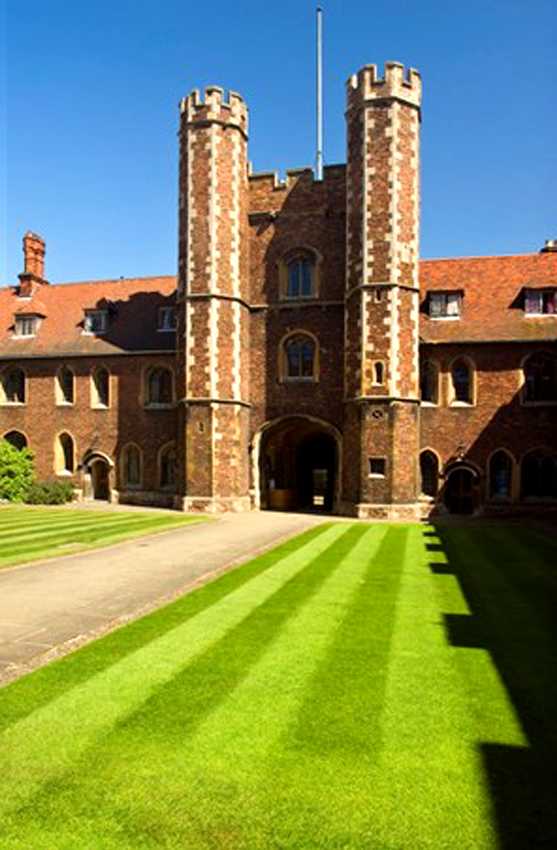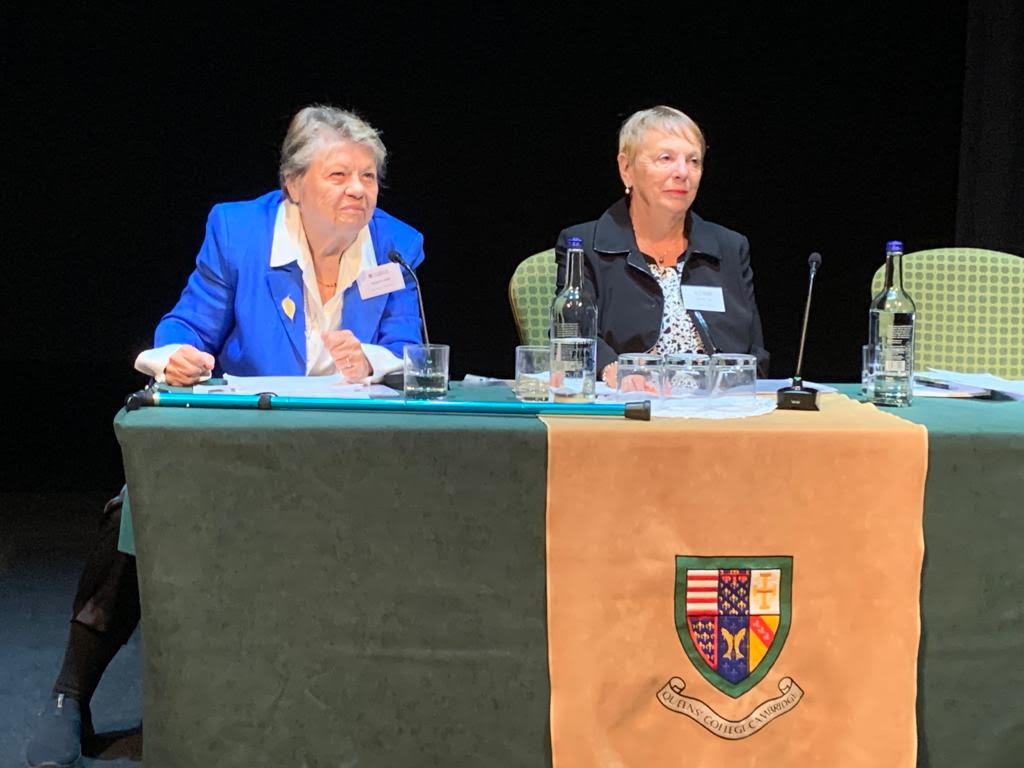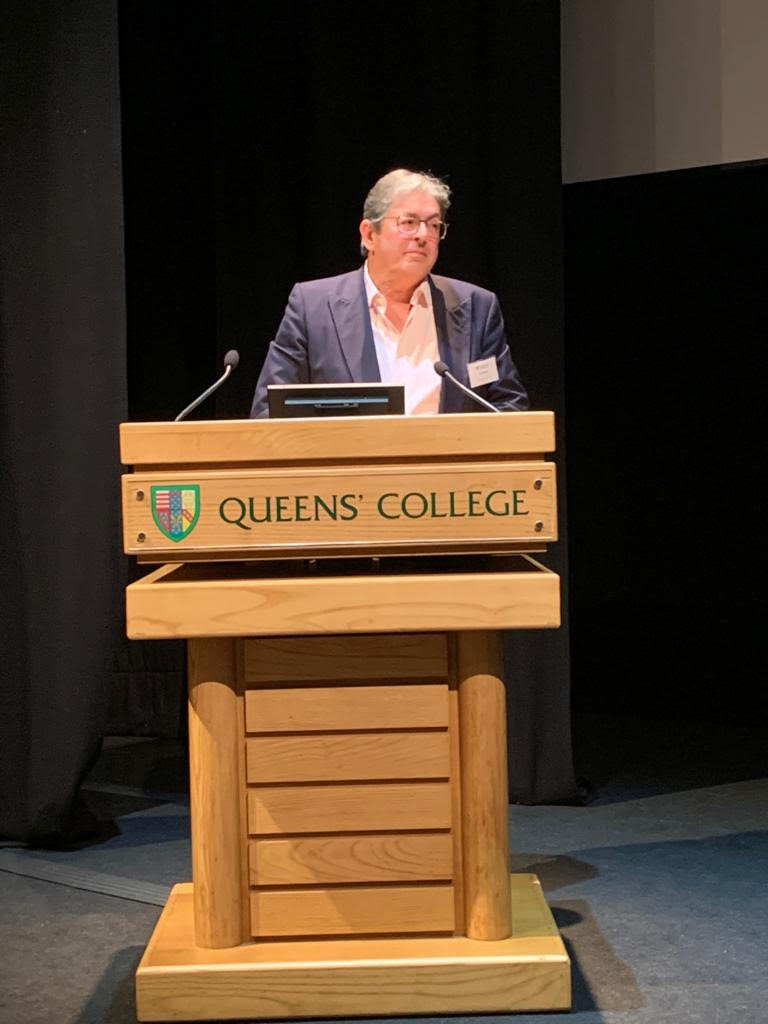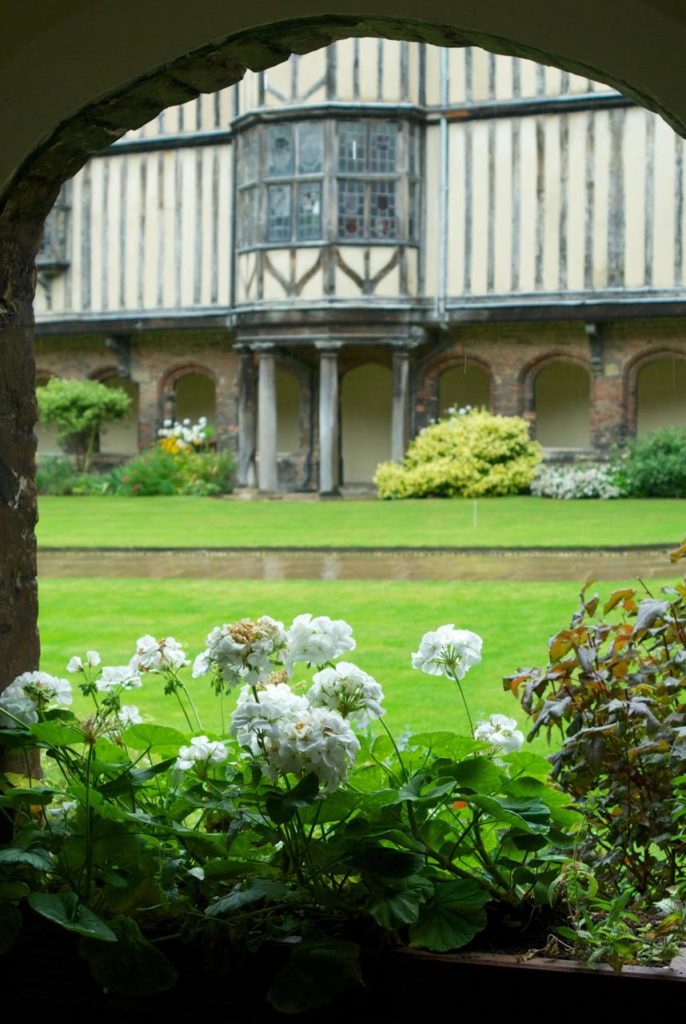Conference Report
The avalanche of positive emails received from delegates and speakers post-Conference was wonderful. The purpose of the few days we spent in Cambridge was to set the publication of the 1723 Constitutions within its contemporary context and explore and discuss how the Enlightenment ideas contained in its pages were transmitted and evolved both in England and across the various freemasonries that emerged in Europe and America. And these objectives were achieved in spades!
The Conference took place from Friday, 22 September, to Sunday, 24 September, with over 160 delegates attending from across the world. They and we enjoyed a unique opportunity to hear some twenty presentations from a slate of world-class academic and masonic speakers hailing from Europe, the United States and Britain.
The event had been publicised via QCCC, UGLE and on social media, and the audience included delegates who had flown in from the United States and Latin America, as well as the furthest flung reaches of Europe. Attendees had the choice of excellent accommodation at Queens’ College or a number of nearby hotels. And for those driving to Cambridge, accommodation (and parking) was available at the Moller Centre, Churchill College, a purpose-built conference centre.
Friday’s programme began with Jonathan Spence, ProGM, welcoming the delegates and Ric Berman, as Conference chair, introducing the speakers and the over-arching theme.
The first speaker, Pierre-Yves Beaurepaire, presented an extremely entertaining and comprehensive overview of the development of freemasonry in eighteenth-century Europe. Pierre-Yves is Professor of History at the University Côte d’Azur at Nice, France, and a senior fellow of the Institut Universitaire de France. He has written twenty books in the field of cultural history, sociability and networks, and specializes in eighteenth-century European history. He has taught internationally, including San Francisco State University, Brussels Free University and Tokyo University.
Pierre-Yves was followed by Professor Olivier Badot, who spoke on the influences of the Anderson Constitutions on eighteenth-century French freemasonry. This was an opportunity to look at the development of chivalric freemasonry, the ‘higher’ orders and the emergence of the Scottish Rite. Another entertaining speaker, Olivier has degrees in Law and Political Science, and doctorates in Economics and Anthropology, all at La Sorbonne. Initiated into one of France’s oldest English lodges, Britannic-Fidelity Lodge No. 9-10, he is a member of the French national research Lodge, Villard de Honnecourt (GLNF), and actively involved in the National Centre for Instruction and on the editorial board of “Transmettre l’histoire”.
Professor Cécile Révauger, a French historian and historiographer at the University of Bordeaux and a member of the Grande Loge féminine de France, gave a superb paper on Women’s freemasonry in eighteenth-century France and its legacy. The emergence of women’s freemasonry is a fascinating development and Cécile’s paper took us on a journey from eighteenth-century France through to the twenty-first century.
In keeping with the continental European theme, Lucio Artini’s paper, ‘Freemasonry’s Tenets: A threat to Absolutism’, examined the events surrounding the papal attacks on the English Lodge at Florence and revealed primary documents newly accessed from the city’s archives. The paper touched on the political intrigues at the Vatican and how this was translated into papal bulls. Lucio holds a degree in Political Science from the University of Florence specialising in Modern and Contemporary History, and his excellent research focuses on the political and religious dimensions of eighteenth-century Italian freemasonry.
Friday’s final event was a panel of four speakers – Leif Endre Grutle, Andreas Önnerfors, Niels Arne Dam & Haukur Óskarsson – each of whom spoke on different aspects of Nordic Freemasonry & the Swedish Rite. This was a rare opportunity to look at the origins and development of the Swedish Rite across the Nordic countries and to hear from speakers with an intimate knowledge of the subject.
Leif, the first speaker, is Knight & Commander with the Red Cross, the XI and highest degree of the Swedish Rite. He is the immediate past Master of Niels Treschow Lodge, the Research Lodge of the Order, and co-editor of Acta Masonica Scandinavica, the annual transactions of Scandinavian Masonic Research. Andreas Önnerfors was from 2007-10 Director of the Centre for Research into Freemasonry and Fraternalism at Sheffield and a Senior Lecturer in History. Having taught at the Universities of Gothenburg and Lund, and as Professor in Intellectual History in Salzburg, Austria, he is now back in Sweden at Linnaeus University. Niels Arne Dam holds the XI degree in Swedish Rite and in 2018 was appointed Grand Herald in the Danish Order of Freemasons having previously been Grand Historian. He is a member of the Danish Research Lodge, Friederich Münter, and has served as its Orator since 2021. The final panel speaker, Haukur Óskarsson, is the current Master of St. John’s Research Lodge Snorri, Iceland.
A reception in the College Bar followed Friday’s programme, kindly sponsored by Lewis Masonic.
Saturday began with Ric Berman and Cécile Révauger introducing and providing a retrospective on the work of the morning’s keynote speaker, Margaret Jacob. Now Emeritus Professor, Margaret is a renowned American historian of science and Distinguished Professor of Research at UCLA, where she specializes in the history of science, knowledge, the Enlightenment and Freemasonry. Her books are numerous and include The Secular Enlightenment (2019); The Origins of Freemasonry. Facts and Fictions (2005), The Radical Enlightenment: Pantheists, Freemasons and Republicans (1981), and Living the Enlightenment: Freemasonry and Politics in Eighteenth Century Europe (1991). Her most recent work is Freemasonry and Civil Society (2023). Margaret’s paper examined eighteenth-century freemasonry in the context of the Enlightenment and the issue of democracy, referencing Robert Samber, the eighteenth-century author.
The following papers were from two outstanding Cambridge academics: Andrew Thompson and Patricia Fara. Dr Andrew Thompson is Senior Tutor of Queens’ College and a Newton Trust-affiliated lecturer in the Faculty of History. He researches and lectures on eighteenth-century history, including the growth of the public sphere, and his work covers the Hanoverian monarchy, eighteenth-century politics, religion and diplomacy. Andrew’s entertaining talk focused on ‘Hanoverian Britain: Culture & Society’. Complementing Andrew’s paper, Patricia’s talk centred on ‘Desaguliers, the Royal Society, & the Scientific Enlightenment’. Patricia is a historian of science and an Emeritus Fellow of Clare College, where she was previously Director of Studies in the History and Philosophy of Science. She has written numerous popular books on science and scientists, including Newton and Desaguliers.
The afternoon session began with a paper from Bridgett Orr, Professor of English at Vanderbilt College of Science in the US, who talked about freemasonry, the theatre and the arts. Her first book, ‘Empire on the English Stage, 1660-1714’ (2001), describes and analyses the ways in which late Stuart theatre dramatized the potential – and costs – of empire in the early stages of colonial expansion, and her second, ‘British Enlightenment Theatre: Dramatizing Difference’ (2020), focuses on radical dimensions of early eighteenth-century English theatre, exploring themes including religious toleration and freemasonry.
Bridget was followed by Susan Sommers, Professor of History at Saint Vincent College, Latrobe, Pennsylvania, and the author of ‘Thomas Dunckerley and English Freemasonry’ (2012) and ‘The Siblys of London: A Family on the Esoteric Fringes of Georgian England’ (2018). Her many articles include (with Andrew Prescott), “James Anderson: A Child of his Time”, and “Searching for the Apple Tree,” in ‘Reflections on 300 Years of Freemasonry’.
Taking a break from the lectures, delegates were then entertained by the short film produced for the Especial Meeting of UGLE in January 2023. This was followed by Akram Elias, the former GM of the Grand Lodge of Washington DC, who gave his brilliant Prestonian Lecture: ‘The 1723 Constitutions. The Indispensable Trowel: Cementing America’s Foundations’.
Imbued with a new enthusiasm for masonic research, delegates took a short break before reconvening in the evening for a drinks reception in Queens’ mediaeval Old Hall, kindly sponsored by UGLE, which was followed by a formal dinner in Cripps Hall. The guest of honour was the Deputy GM, Sir David Wooton.
Sunday began with two speaker panels. The first comprised Pierre-Yves Beaurepaire and Andreas Önnerfors, who spoke on ‘Freemasonry & Revolutionary Europe’, and the second, Oscar Alleyne and John Kyle Day, who looked at different elements of Black Freemasonry in America. The morning’s theme was ‘Breaking Barriers’ and the papers – each of which was quite outstanding – lived up to that. Oscar is a former Junior Grand Warden of the Grand Lodge of New York, a Past Commander in Chief and Past Sovereign Prince of the Scottish Rite Valley of the Hudson and the first Grand Superintendent for the State of New York of the Grand Council of the Allied Masonic Degrees USA. He is a senior member of several Masonic Research societies and lectures internationally on historical, ritualistic, philosophical and other Masonic topics. Our final speaker was John Kyle Day, Professor of History at the University of Arkansas at Monticello and Past Master of Acacia-Twilight No. 114, A.F. & A.M. of Missouri. John is active in many professional and Masonic research societies as well as appendant and concordant bodies of Freemasonry. Oscar and John’s papers explored black freemasonry in America and how that evolved from the late eighteenth century into the twentieth. The papers were a fitting end to three excellent days.
It was splendid to see both members of Quatuor Coronati Lodge and the QC Correspondence Circle and so many others from near and far coming together to share a common interest in freemasonry and masonic research.
The Conference Proceedings will be published in 2024.
Professors Margaret Jacob & Cécile Révauger
Dr Ric Berman, Conference Chair
Queens’ College, Cambridge





